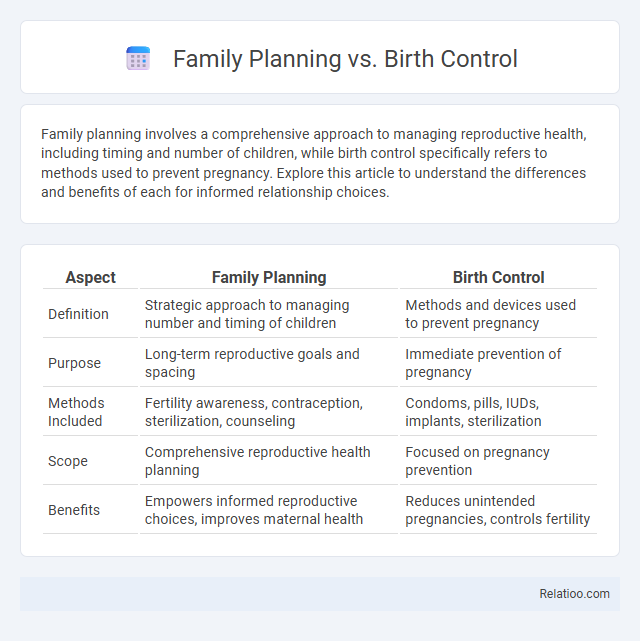Family planning involves a comprehensive approach to managing reproductive health, including timing and number of children, while birth control specifically refers to methods used to prevent pregnancy. Explore this article to understand the differences and benefits of each for informed relationship choices.
Table of Comparison
| Aspect | Family Planning | Birth Control |
|---|---|---|
| Definition | Strategic approach to managing number and timing of children | Methods and devices used to prevent pregnancy |
| Purpose | Long-term reproductive goals and spacing | Immediate prevention of pregnancy |
| Methods Included | Fertility awareness, contraception, sterilization, counseling | Condoms, pills, IUDs, implants, sterilization |
| Scope | Comprehensive reproductive health planning | Focused on pregnancy prevention |
| Benefits | Empowers informed reproductive choices, improves maternal health | Reduces unintended pregnancies, controls fertility |
Understanding Family Planning and Birth Control
Understanding family planning involves managing the timing and spacing of pregnancies through a range of methods tailored to your health and lifestyle goals. Birth control refers specifically to the techniques or devices, such as condoms, pills, or IUDs, used to prevent pregnancy within the broader scope of family planning. Your informed choices in family planning and birth control empower you to achieve reproductive goals while promoting overall well-being.
Defining Key Terms: Family Planning vs Birth Control
Family planning encompasses a comprehensive approach that includes strategies and methods to control the timing and size of your family, aiming at overall reproductive health. Birth control specifically refers to the various techniques and devices used to prevent pregnancy, such as condoms, contraceptive pills, and intrauterine devices (IUDs). Understanding the distinction helps clarify that birth control methods are tools within the broader scope of family planning goals and decisions.
Historical Perspectives on Reproductive Choices
Historical perspectives on reproductive choices reveal that family planning and birth control have evolved as distinct but interconnected concepts. Family planning encompasses a broader range of strategies aimed at spacing and limiting births based on economic, social, and health considerations, while birth control specifically refers to methods and devices used to prevent pregnancy. Over time, movements like the early 20th-century birth control advocacy by Margaret Sanger and the establishment of organizations such as Planned Parenthood have shaped public attitudes and policies surrounding reproductive autonomy.
Goals and Objectives of Family Planning
Family planning aims to help you achieve your desired number of children and the spacing between them through informed choices, improving maternal and child health outcomes. Birth control refers to methods used to prevent pregnancy, including hormonal, barrier, and natural techniques, which serve as tools within family planning strategies. The primary goal of family planning is to empower individuals and couples with knowledge and access to reproductive health services to enhance quality of life and promote sustainable population growth.
Methods of Birth Control: An Overview
Methods of birth control encompass a variety of options designed to manage fertility and prevent pregnancy, including hormonal methods like pills and patches, barrier methods such as condoms and diaphragms, intrauterine devices (IUDs), and permanent solutions like sterilization. Family planning involves not only selecting appropriate birth control methods but also considering the timing and spacing of children to support overall reproductive health. Your choices in birth control methods should align with your health needs, lifestyle, and family planning goals for effective and personalized care.
Benefits of Family Planning for Individuals and Communities
Family planning empowers individuals by enabling informed decisions about the timing and number of children, leading to improved maternal health and economic stability. Access to family planning reduces unintended pregnancies, which lowers healthcare costs and supports population management, benefiting entire communities. Your well-being and quality of life improve as family planning promotes better child spacing and resource allocation.
Myths and Misconceptions about Birth Control
Birth control is often misunderstood, with common myths suggesting it causes infertility or severe health risks, which scientific research consistently disproves. Family planning encompasses a broader approach, including education, resources, and support to help you make informed reproductive choices beyond just contraception methods. Clarifying these misconceptions ensures more effective and confident decision-making within your family planning goals.
Cultural and Religious Influences in Family Planning
Cultural and religious influences play a significant role in shaping family planning choices and attitudes toward birth control methods. Your decisions about family planning often reflect deeply held beliefs and values that vary widely across communities and faiths, impacting the acceptance and usage of contraception. Understanding these influences helps tailor family planning programs that respect cultural identities while promoting reproductive health.
Accessibility and Availability of Birth Control Methods
Accessibility and availability of birth control methods significantly impact family planning effectiveness worldwide. Diverse options like condoms, oral contraceptives, IUDs, and implants vary in accessibility across regions due to economic, cultural, and healthcare infrastructure differences. Improving supply chains, education, and affordable healthcare services enhances the practical use of birth control within broader family planning strategies.
Choosing the Right Option: Family Planning vs Birth Control
Choosing the right option between family planning and birth control depends on individual goals and reproductive health needs. Family planning encompasses a broader range of strategies, including fertility awareness, natural methods, and assisted reproductive technologies, whereas birth control specifically refers to methods preventing pregnancy, such as contraceptives like pills, IUDs, and condoms. Understanding the differences helps individuals and couples make informed decisions tailored to their lifestyles, health conditions, and future family goals.

Infographic: Family Planning vs Birth Control
 relatioo.com
relatioo.com